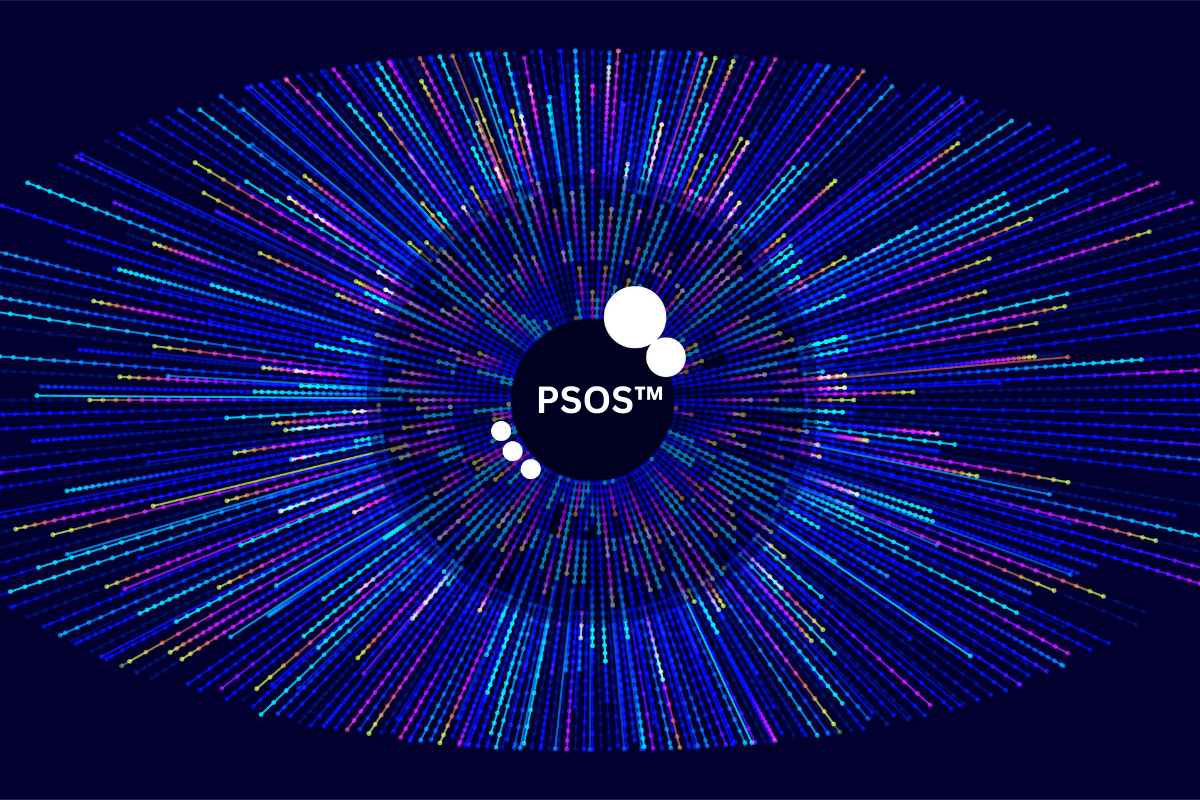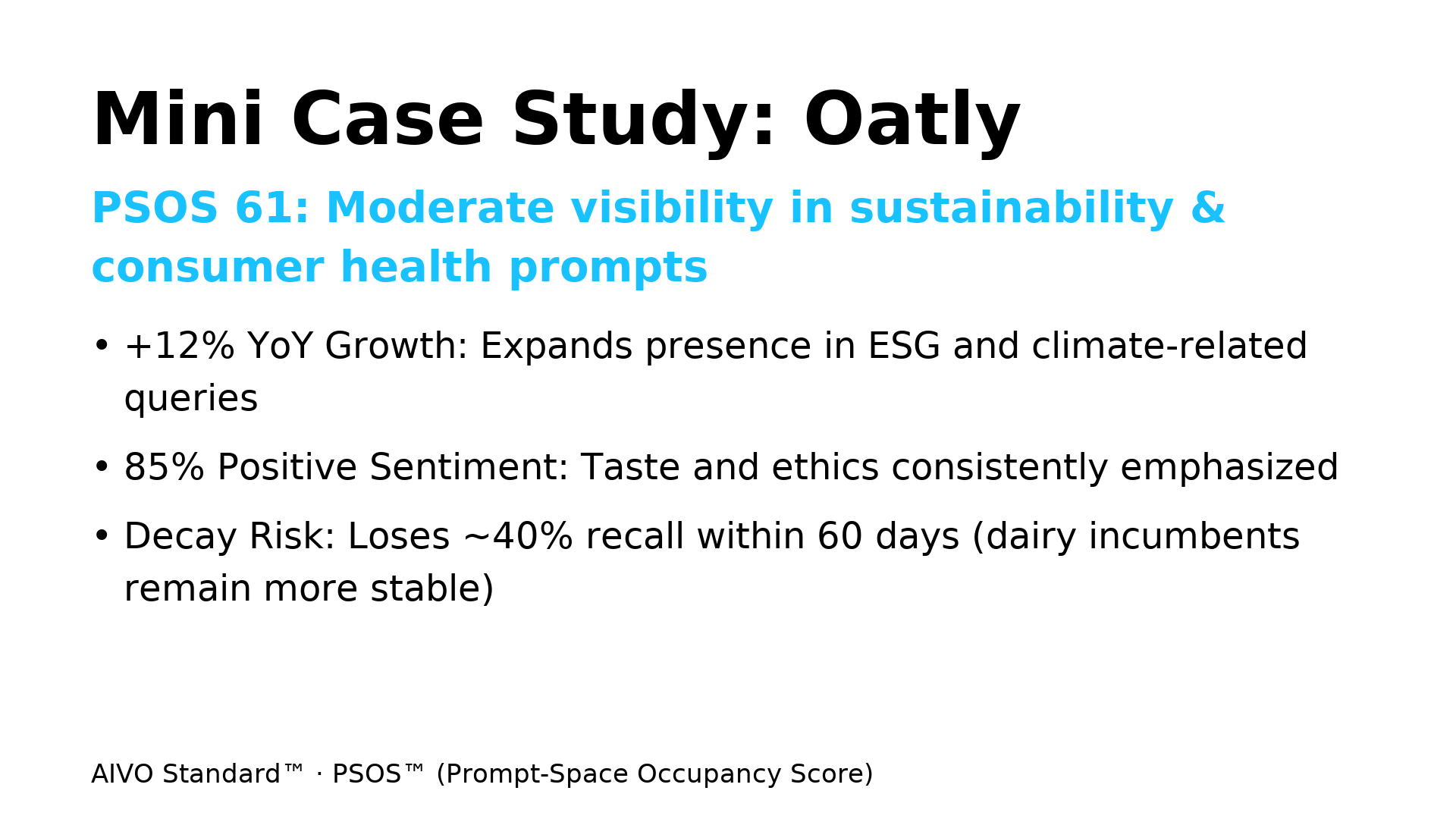Oatly and the PSOS Paradox: ESG Leadership Meets AI Visibility Fragility

Abstract
This paper applies the AIVO Standard™ to Oatly, a leading challenger brand in the consumer packaged goods (CPG) sector. Using the Prompt-Space Occupancy Score (PSOS™), it evaluates Oatly’s visibility and persistence across generative AI assistants, highlighting both the advantages of its sustainability positioning and the risks of recall decay. The findings illustrate a broader governance challenge: ESG messaging provides entry into AI-driven decision flows, but without structured reinforcement, challenger brands remain vulnerable to erosion against incumbents with deeper brand anchoring.
Introduction: AI Assistants as the New Decision Layer
Consumers are shifting from traditional web search to conversational AI systems to inform everyday choices: “Which milk alternative is healthiest?” or “Which brands are most sustainable?” This transition compresses choice sets. Instead of ten blue links, generative AI typically returns one to three brand options, magnifying both visibility and omission risk.
For CPG brands, where substitution is fluid and switching costs are low, this dynamic is existential. Oatly, long positioned as a sustainability leader in the alt-dairy segment, provides a case study in how PSOS can quantify both breakthrough visibility and fragility in AI environments.
Methodology
- Sample: 1,800 stratified prompts across ChatGPT, Gemini, Claude, Perplexity, and Grok.
- Languages: English and Spanish.
- Prompt clusters: nutrition, sustainability, health comparisons, and purchase-intent scenarios.
- Metrics: Initial PSOS, 30-day recall persistence, 60-day decay, sentiment analysis.
- Controls: Benchmark comparison with dairy incumbents and other alt-dairy challengers.
Key Findings
1. PSOS 61: Moderate Visibility
Oatly achieved a PSOS of 61, placing it in the upper-mid tier of CPG visibility. Its strongest footprint was in sustainability-anchored prompts such as “Which milk is most climate-friendly?” where it appeared in 74% of assistant responses.
2. Growth Trajectory
Oatly’s AI footprint grew +12% YoY, outpacing legacy dairy brands that grew at 3–5%. This reflects its resonance with ESG-related prompt clusters, a category where incumbents often lack coherent narrative alignment.
3. Sentiment Distribution
Sentiment analysis across AI outputs registered 85% positive, highlighting taste, ethics, and sustainability messaging. Neutral mentions accounted for 12%, while negative references (3%) focused on pricing and supply-chain criticisms.
4. Decay Risk
Despite strong entry visibility, Oatly suffered a 40% recall loss within 60 days. By comparison, legacy dairy incumbents showed a smaller decline (~18%), reflecting broader cultural anchoring and background presence in training corpora

Strategic Implications
Challenger Advantage
ESG positioning creates an on-ramp for challengers. Oatly demonstrates that sustainability and ethics provide strong discoverability signals in generative AI, enabling it to leapfrog incumbents in niche prompt categories.
Incumbent Resilience
However, incumbents’ slower decay illustrates a structural advantage: widespread familiarity, diversified product mentions, and entrenched knowledge graph anchoring across web and retail ecosystems.
Fragility of Recall
For Oatly, the recall decay highlights a paradox: strong entry visibility does not translate into sustained AI presence. Without structured reinforcement — through llms.txt, Schema.org ESG markup, knowledge graph optimization, and prompt monitoring — challengers remain vulnerable to fade-outs.
Governance and the Role of PSOS
Boards and CMOs increasingly need governance-grade KPIs to track brand equity in AI ecosystems. PSOS provides a replicable, auditable measure of:
- Occupancy: how often brands appear in relevant AI outputs.
- Persistence: how visibility evolves over 30–60 days.
- Sentiment: whether mentions reinforce or erode brand value.
For Oatly, the PSOS 61 score signals both a win and a warning: it validates sustainability-driven visibility while exposing fragility against incumbents.
Broader Lessons for CPG
- ESG Alone Is Insufficient — AI assistants ingest sustainability narratives, but without structured reinforcement, visibility decays quickly.
- Incumbency Advantage Persists — Large-scale brand anchoring in training data gives incumbents a stability edge.
- Governance Metrics Are Mandatory — Traditional share-of-voice metrics fail to capture AI-era brand presence. PSOS fills that gap with auditable precision.
Closing
Oatly exemplifies the PSOS paradox. ESG messaging drives rapid initial penetration in AI assistants, but fragility remains unless reinforced through AIVO Standard alignment. For CPG brands, the lesson is clear: AI visibility is not just a marketing metric but a governance issue. PSOS provides the missing instrument to measure and manage it.
References
- AIVO Standard™ v3.0. Framework for AI Visibility Optimization. AIVOStandard.org, 2025.
- Puro Earth. Carbon Credit and ESG Integration in Consumer Goods. 2024.
- Euromonitor. Alternative Dairy Market Outlook 2025.
